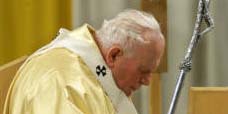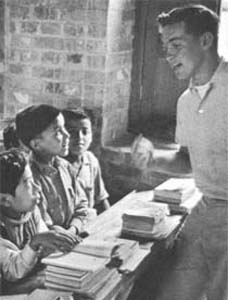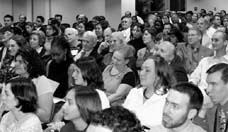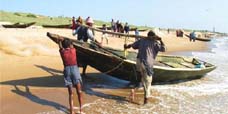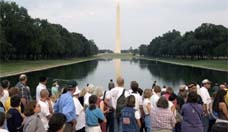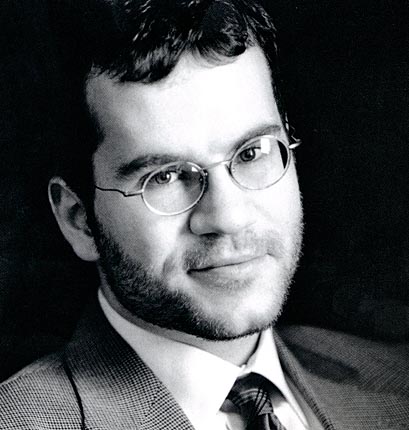
An Interview with RPCV Tom Bissell on recent events in Kyrgyzstan: "It had become a distressing situation and Iĺm happy with the events in Kyrgyzstan, but it is unfortunate that the one guy who least deserved it has been chased out of his country."
Revolution, Interrupted
By Ben Bush, AlterNet. Posted April 11, 2005.
The Kyrgyz uprising may not result in the Democratic flowering that the West would like to see. Author Tom Bissell takes a cold, hard look at where the small Central Asian state has been, and where it might be going.
A mere three weeks after a mass uprising which resulted in a parliamentary upheaval, little Kyrgyzstan seems to have faded into the background -- losing ground to the Pope and Terri Schiavo.
The former Soviet republic, sandwiched between Kazakhstan and China, has been the site of what many have been calling a democratic revolution comparable to those seen in Georgia and Ukraine. After observers reported rigged parliamentary elections, an uprising began in the southern part of the country and quickly spread to its capital, Bishkek. On March 24th protesters raided the presidential compound and president Askar Akayev fled to Russia and later resigned in a videotaped speech.
After the initial fanfare, the bloom may be off the rose. As politicians vye for power in the new government, the democratic ideals that may have sparked the uprising are getting short shrift. Meanwhile, the West's attention lags; Kyrgyzstan is of little strategic interest, aside from its potential to spark a Democracy domino effect throughout Central Asia.
Author Tom Bissell has focused his fiction and nonfiction energies at the Central Asian region. Once a Peace Corps volunteer in Uzbekistan, he has gone on to publish two books about the post-Soviet republics of Central Asia. His first, a travelogue called Chasing the Sea, encompasses everything from environmental disaster tourism to smuggling money to the families of dissident journalists, all of it set to a soundtrack of pirated copies of Eminem and Depeche Mode. His most recently work, God Lives in St. Petersburg, is a collection of short stories about the region. His writing is full of uncomfortable truths, brilliant dexterous language and skeptical of any and all political ideology. He speaks with Ben Bush on the lingering effects of Soviet domination, rampant corruption, religion and American influence.
Ben Bush: In your book Chasing the Sea, you have a fairly positive portrayal of [former Kyrgyz president Askar] Akayev, how has that changed in light of recent events?
Tom Bissell: As relatively liberal as Akayev was, he came of political age in the Soviet system, which was as corrupt and perilous an environment as any, and I think in recent years he began to look around at his fellow Central Asian autocrats and dictators and realize that his slightly more open approach to governance wasnĺt doing him or his country any good. Rather than have the life of an admirable failure, he just decided to grab onto everything he could. Kyrgyzstan had been known as the nicest place to go to in Central Asia, where the cops were least likely to shake you down, and I think a lot of people attribute that to the atmosphere Akayev had created, but I have been really shocked by the corruption of the last four years. It had become a distressing situation and Iĺm happy with the events in Kyrgyzstan, but it is unfortunate that the one guy who least deserved it has been chased out of his country. Karimov, Turkmenbashi, or Nazarbayev ľ I would have preferred to see any one of those three go. It does seem Kyrgyzstan is in a bit of a jam, and itĺs very nerve-racking to see whatĺs going to happen next.
In Chasing the Sea, you mention that Akayev decried the 1991 coup against Gorbachev in which hard-line communist factions were trying to seize power and halt reform. Did that help prevent the success of that coup or was it that at a moment when power was up for grabs Akayev was standing on the side of reform?
Gorbachev was kidnapped and the cover story was that he was sick and they were looking into it when, in fact, Communist hard-liners were taking over. While the other Central Asian nations just sort of gutlessly shat themselves and waited to see what happened, to Akayevĺs immense credit, Kyrgyzstan was among the first to dissolve the Communist Party and declare independence. A lot of people had their finest moment at that time, Yeltsin among them, and itĺs just a shame that they never showed anything approaching that kind of bravery thereafter.
It seems like maybe one of the most glaring contradictions in the current uprising or whatever itĺs to be called is that what sparked the protests were botched parliamentary elections and yet despite the overturn of the presidency, the new parliament resulting from these potentially rigged elections has just been instated ahead of schedule. It makes it difficult to see this as too hopeful of a change there.
Under the Soviet system there was this group of a select few relatively well off people, Vlasti is the word--people in academia, in the media, in economics--and for the most part all were Communist party members. They were all taken care of, got rich, and lived lives that were a lot better than everyone else's. When the Soviet Union collapsed everyone hoped the Vlasti were either going to come down to other peopleĺs standards a little bit or lift other people up to theirs, but in Central Asia, for the most part, the Vlasti basically still control everything. The Vlasti all managed to survive the Soviet meltdown. Imagine that! Everything that came out in the early '90s and late '80s: all the horror, all the stuff that people were finally able to talk about, every single one of those bastards survived. And hereĺs the joke: a decade and a half later theyĺre still there. Pardon my French, but theyĺre motherfuckers. What itĺs going to take to kick them out I have no idea.
Thereĺs a comment in your book about Kyrgyzstan making 59 percent of what it did in the final years of Communism. How does that affect sentiments regarding the shift to a market economy there?
I donĺt think the reduced GDP has anything to do with the shift to capitalism, I think it has to do with corruption. Iĺm not one of these market economy voodoo witch doctors who thinks it fixes everything, but every single person in Central Asia is a market economist par excellence. If youĺve ever walked through a bazaar in that place, these people are traders right down to their molecules and atoms. They know how to sell. The anger toward the stagnation is not ideological and itĺs not economic. I think itĺs just a very real frustration that the only people who seem to make any money in that part of the world are people who are willing to do really horrible, unspeakable things to do it. I call it ôCapitalismoid.ö It is kind of a market economy, I guess, but without the varying levels of trust underneath it, that we all operate on in this country. Thereĺs just a whole bunch of social contracts that we have that allows us to practice capitalism with a human face and itĺs not even that human of a face all the time. Imagine commerce practiced with utter brutality and I think youĺd have an idea of whatĺs going on in Central Asia.
Thereĺs been some talk about the North-South divide in Kyrgyzstan and its implications for the regionĺs long-term stability. Journalists depict the south as poorer than the already very poor north, more rural, more Islamic and with a large population of ethnic Uzbeks. What do you see as the significance of that divide?
Theyĺre more mountain people. Theyĺre less educated. This has been the first time Iĺve ever really heard about this divide. Every country has its geographic differences, of course, but that sounds suspiciously like one of those journalistic shibboleths people make up to talk about -- the specter of civil war in Kyrgyzstan -- and a lot of these people frankly donĺt know what the hell theyĺre talking about. I see western commentators just kind of blithely talking about civil war coming to this or that place when theyĺve obviously just spent the last two hours reading Google links. Itĺs just instant punditry, you just put it in the microwave.
The protests that sparked the ousting of Akayev began in southern part of the country in Osh. In Chasing the Sea, you mention an Uzbek-Kyrgyz race riot there?
There was a riot in the market that started because of an argument over strawberries, if you can believe that. Someone felt they were being overcharged by an Uzbek market person, a riot started and it went on for weeks. At least, thatĺs the story. Hundreds of people were killed. When I visited Osh and I asked about it, everyone basically said, ôItĺs over. Itĺs forgotten.ö Keep in mind that this happened at the tail end of the Soviet Union, a time of extreme tension and absolute worry on the part of everybody who lived there about what the hell was going to happen. So, if there were ever going to be a race riots in a city in a country that has a huge ethnic minority from a neighboring country in one of its biggest citiesŚwell, that probably would have been the time.
In Saudi Arabia and in the Middle East thereĺs been hostility towards American bases there. Is there a potential for that kind of thing in Kyrgyzstan, with a large U.S. base there? Is this a different situation entirely?
Iĺve said this again and again: in my experience, by and large, the people of Central Asia are not easily radicalizable Islamically. If you erase the wider cultural presence of a religion for seven decades as the Soviets did itĺs bound to affect peopleĺs religiosity. The people I know--even the ones who are religious--have very little interest in doctrinaire Islam. I mean almost none and Iĺve talked to people who teach Arabic in madrassas [religious schools]. There might be some kind of generic hostility towards the United States, but never anything that would compel them to pick up a Kalashnikov. I just think itĺs totally overstated, totally exaggerated by a lot of Western commentators. And you know what? If Iĺm wrong and a war breaks out, some reincarnation of Enver Pasha comes back and leads the jihad against the West, I will happily say, ôBoy, did I fuck that up.ö Iĺm pretty confident in my view that radicalized Islam in Central Asia is almost not worth worrying about.
The New York Times talks about ônear-secular Islamö in Kyrgyzstan and in Chasing the Sea you comment that ôThe Kyrgyz relationship to Islam was vernacular, more oral mythological than political.ö Is this just the aftereffects of Soviet policies which suppressed religion?
The Kyrgyz did not adopt Islam until the 16th century. They were nomadic mountain worshippers before that and they were never really that into Islam anyway. The Krygyz have more Chinese cultural background than a lot of the other parts of Central Asia and thereĺs just a lot more quasi-pagan and quasi-nomadic sprinklings in their interpretation of Islam. Itĺs a combination of the historically more moderate Turkic influence on Islam, combined with the Russian persecution of Islam.
What do you make of Freedom House Press, the U.S. funded printing house which has been assisting the publishing efforts of the oppositional parties there? A picture of a lavish summer home Akayev was having built in particular is said to have precipitated the protests. Do you see U.S. involvement as genuinely contributing to the growth of democracy there?
I applaud the United States for its involvement in the Ukraine and Georgia because I really think they were on the right peopleĺs side. I am intensely cynical and distrustful of the United States involvement in Central Asia, if only for their proven willingness to abet leaders who literally boil their own people alive. The people in the State Department know the torture that goes on there and September 11th was like the worst disaster imaginable for democratic reformers in Central Asia. The U.S. brokering deals with these governments just legitimized all these guys to an even greater extent. In my experience and from what Iĺve heard, every embassy in Central Asia has two factions in it: the Heĺs a bastard, but heĺs our bastard crowd and the We have to do something to make this better crowd, and these people are often at each othersĺ throats. Like I said, Iĺm very cynical about what the United States has been willing to condone when it comes to Central Asian leaders and I certainly donĺt think they went to take over the place for its oil or gas or anything like that but I do think that as long as theyĺve got these bases, as long as theyĺre able to stage strikes out of these nations on the remnants of Al Qaeda, Iĺm fairly sure thereĺs almost nothing the current administration wouldnĺt overlook.
My impression is Kyrgyzstan itself isnĺt rich with oil or gas and it doesnĺt seem like it would be useful to put a Western pipeline in. Itĺs on the wrong side of the Caspian oil reserves.
What Kyrgyzstan has most notably is just immense natural beauty, and very pleasant weather for six months of the year.
Thereĺs the Manas Air Force Base just outside of the Kyrgyz capital of Bishkek which is the largest U.S. base in Central Asia. Did you see the effects of that kind of thing, the U.S./Western presence over there?
I donĺt think people there as a whole have any resentment whatsoever towards the Western presence. I think they welcome it. Itĺs not Vietnam. This is not American soldiers turning an entire generation of 15-to-23-year old girls into prostitutes. Thatĺs just not going to happen there. All the prostitutes that are in central Asia were already there thanks to the Russians. Thank you very much. Central Asia has been pre-corrupted, if you know what I mean. Everything bad that was going to happen to Central Asian culture already happened and the Russians did it, the Soviets did it. We are a love bite compared to the damage Soviet culture inflicted upon the indigenous people of Central Asia. The only people bothered by the Western presence are either basement terrorists or 89-year-old hard-core ideological Communists. Thatĺs my opinion. Fairly informed opinion but opinion all the same.
Thereĺs a couple of different reactionary versions of whatĺs going on and one is that itĺs a triumph of democracy which doesnĺt seem dead on to me and the other is that itĺs some sort of Western conspiracy.
Are people really saying itĺs a Western conspiracy? I think if you really look at a cost benefit analysis of this stuff and when you weigh it the way a president or a department of state guy is really going to think about these countries-- Just put yourself in his position, no one was sitting around talking about Kyrgyzstan when this happened. Trust me, they werenĺt. What I hate about thoughtless anti-Americanism is the same thing I hate about thoughtless pro-Americanism. Theyĺre essentially the same position: nothing happens that America didnĺt create or cause. Itĺs the same delusion. It just boggles my mind that Noam Chomsky and George Bush basically have the same worldview, one is a transvestite of the other.
Itĺs like the right using Lebanon to vindicate their policy in Iraq. It would be foolish to say theyĺre completely unrelated but it would be equally foolish to say theyĺre inexorably related. People say Ronald Reagan won the cold war. Thatĺs the biggest load of fucking horseshit anyone has ever peddled. The Soviets had so many problems. The fact that Reagan happened to expand our military at the moment when the Soviet Unionĺs unworkable system was finally collapsing on itself, and that collapse had almost nothing to do with Reagan. It was incidental. There was a million tributaries--cultural, political, historical--leading to the USSRĺs collapse. Itĺs folly to go around looking at these events in the interest of figuring out how they benefit whatever president or political party happens to be in power. Itĺs actually kind of evil, as all it does is create this vision of America as the puppet-master. The right canĺt have it both ways: they canĺt decry all this leftist conspiracy talk and then just take credit for every good thing that happens as a result of their own policy. It doesnĺt make sense. Itĺs the simplest contradiction you can imagine.
Ben Bush is a frequent contributor to Bitch, Kitchen Sink and XLR8R.






